Tech Diplomacy Now - Tech Freedom Summit 2023
Highlights from the 2023 Tech Freedom Summit, a convergence of the world's preeminent leaders in business, technology and diplomacy.
Top News of the Week – Tech Freedom Summit
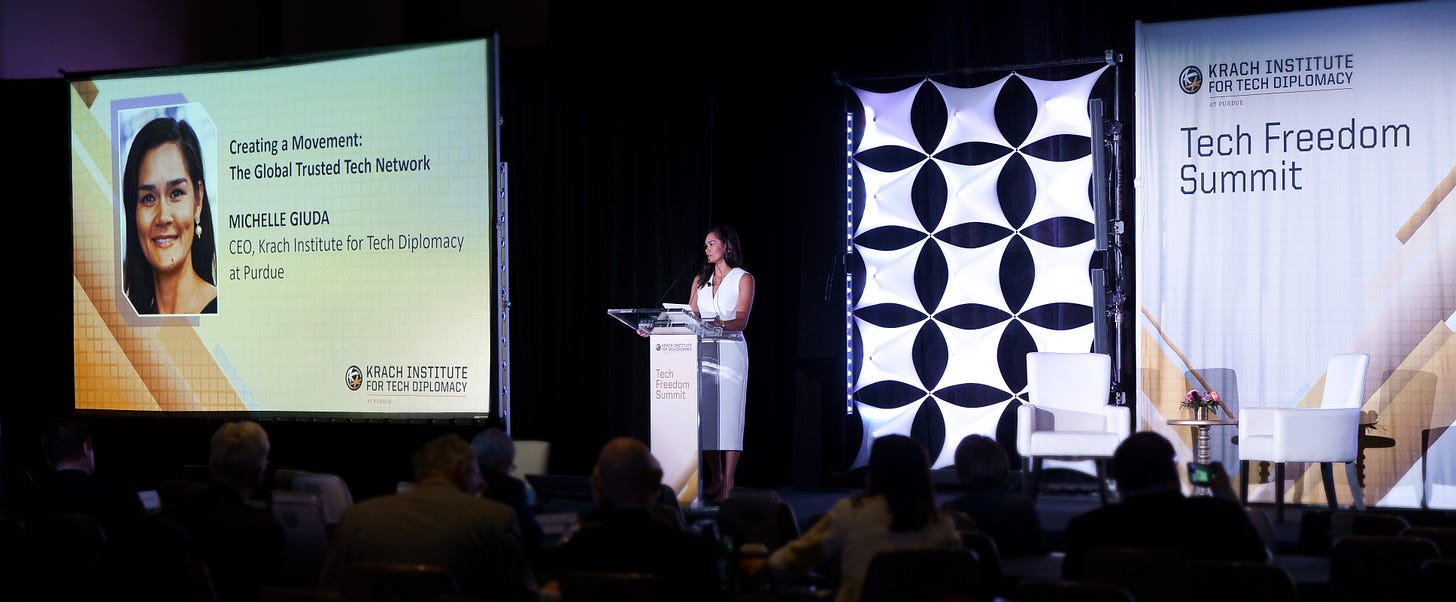
On November 8, 2023, a convergence of thought leaders and innovators marked the Krach Institute for Tech Diplomacy at Purdue's annual Tech Freedom Summit. This prestigious event brought together leaders in technology and diplomacy and featured an impressive lineup of industry experts including U.S. Senator Todd Young (R-IN), Purdue University President Mung Chiang, and U.S. Under Secretary for Public Diplomacy and Public Affairs, Elizabeth Allen.
“There is strength in numbers and power in unity and solidarity. We launched the Institute for Tech Diplomacy at Purdue to ensure that technology advances freedom,” Chairman Keith Krach opened the summit by proclaiming.

Each speaker shared critical insights on trusted technology and the pivotal role tech plays in advancing the principles of freedom, democracy, expanding commerce and defending national security.
Keynote Speakers and Panels
President Mung Chiang brought clarity to the technological landscape we face and encouraged attendees to “believe in the undying human spirit of freedom.”
“With greater gravity and urgency today than ever before, perhaps, in our lifetime, technology must advance freedom. Freedom does not always win. Quite the contrary. Usually it loses,” Chang said. “Technology is born neutral, easily abused to suppress freedom. And we have a mission together to ensure that technology must advance freedom.”
U.S. Senator Todd Young (R-IN) joined Chairman Krach to discuss the CHIPS and Science Act and the Global Tech Security Strategy on critical and emerging technologies like semiconductors and artificial intelligence.
“For non-Chinese countries, if we can harmonize our domestic laws on AI regulation, then we set the rules of the road informed by our values, the values of the Declaration of Independence, the universal values that this country is founded on, that most of the world subscribes to, not the values of the Chinese Communist Party,” Indiana’s senior Senator said.
“Game, set and match if we do that. Because if they want to get scale and sell into the rest of the world in China, they're going to have to subscribe to our values on privacy, on bias and so many other areas.”

How do we advance freedom through Trusted Technology? CEO of the Krach Institute Michelle Giuda said we must first “train and educate.”
“We are going to fill the gap and the need for diplomats, policy makers, military leaders, government leaders, private sector leaders, to understand all the critical components of Tech Diplomacy.”
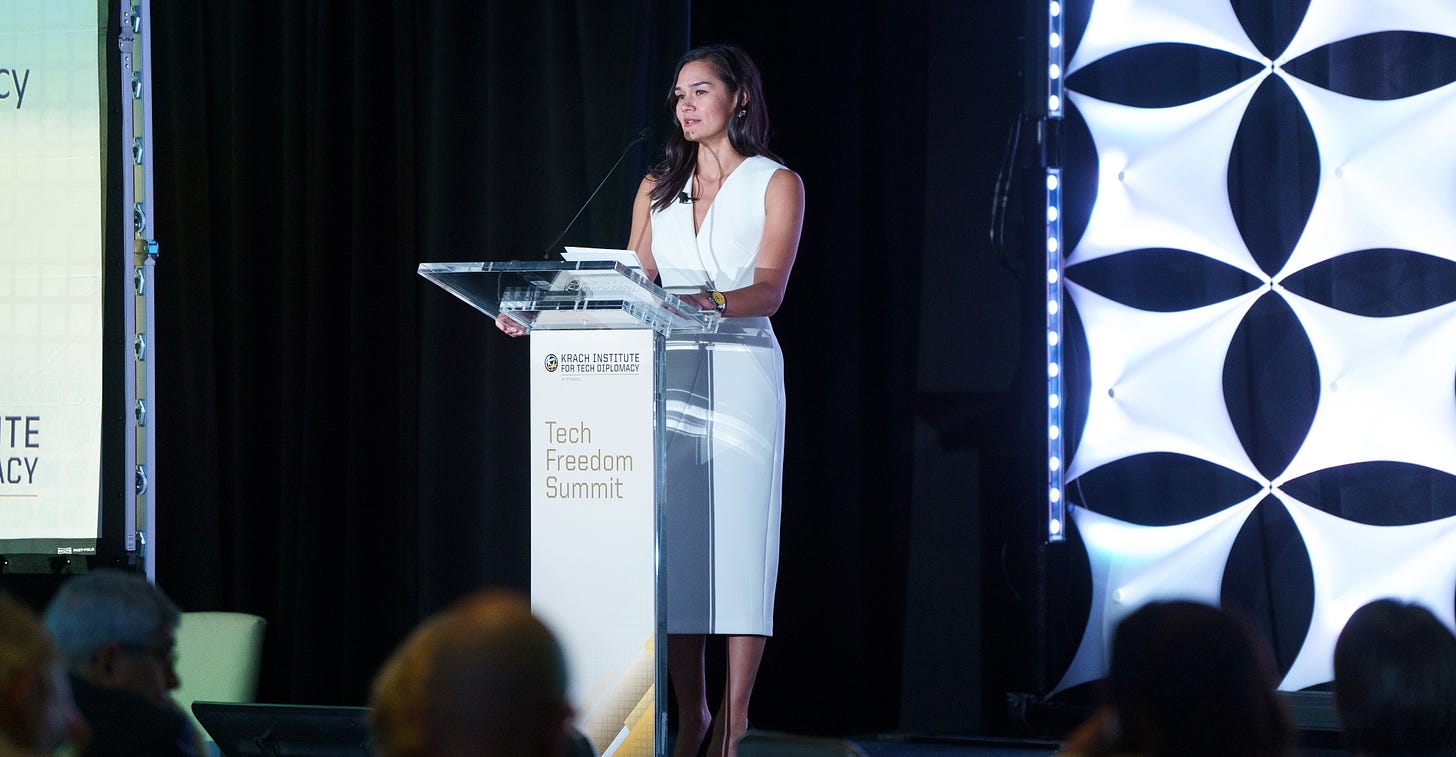
The 'Risk and Responsibility' panel, moderated by Rishi Iyengar of Foreign Policy News, featured discussions on business's new role in global security with panelists Ben Smith, Board Member & Senior Partner at Kearney, Isaac Stone Fish, CEO of Strategy Risks, and former Assistant Secretary of State for Economic and Business Affairs, Manisha Singh.
“We're evolving into a world where you have two stacks. You have the Chinese stack and you have the freedom stack,” Ben Smith said talking about the intersection of business and geopolitics. “And there's a lot of countries and companies who sit in-between who have to make choices.”
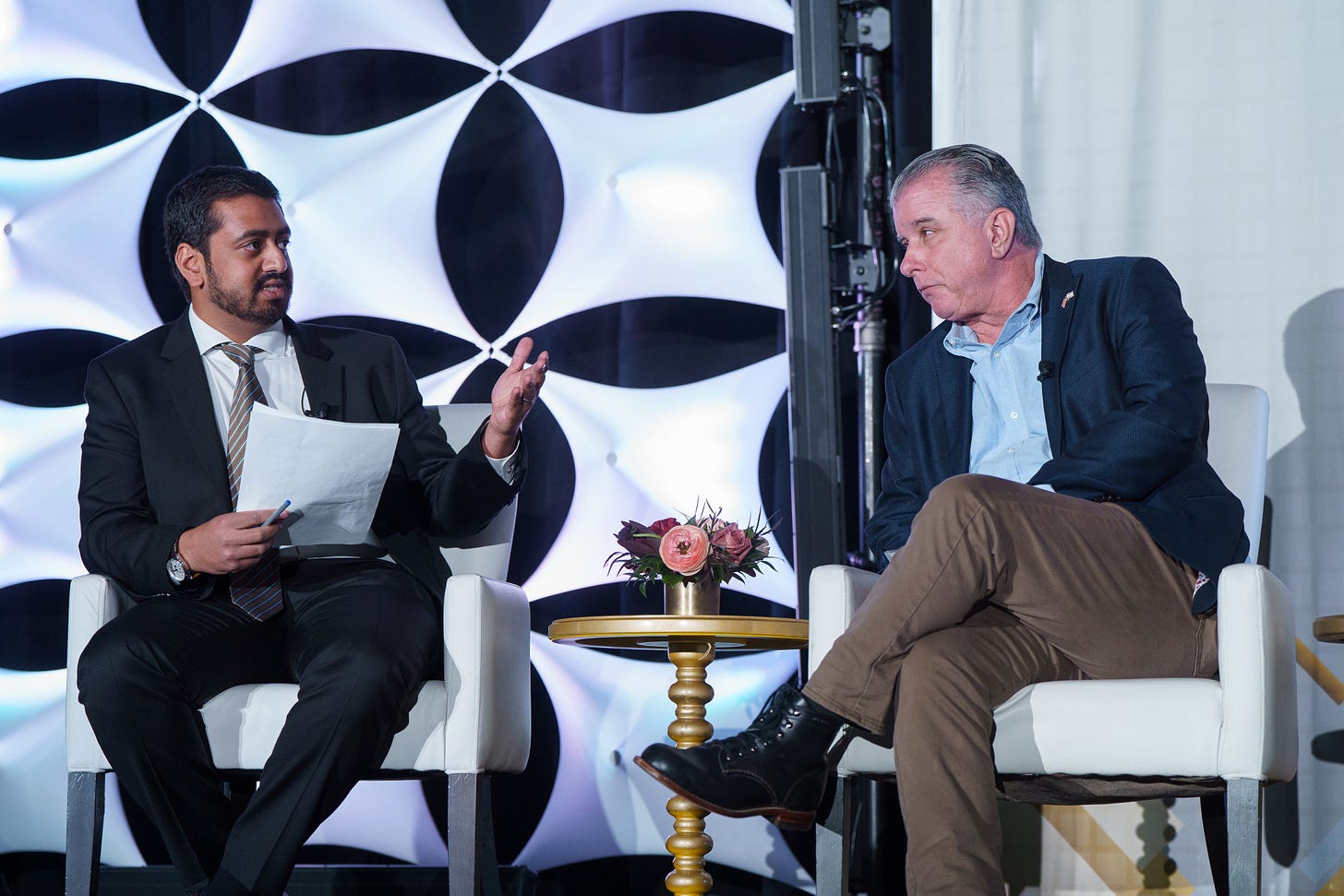
The 'Global Tech Security: Developing a Strategy for the Free World' panel, included Intel’s Steve Pinkos, Senior Fellow at the Krach Institute Nazak Nikakhtar, and Roger Robinson, Jr., and emphasized the development of a comprehensive Global Tech Security Strategy.
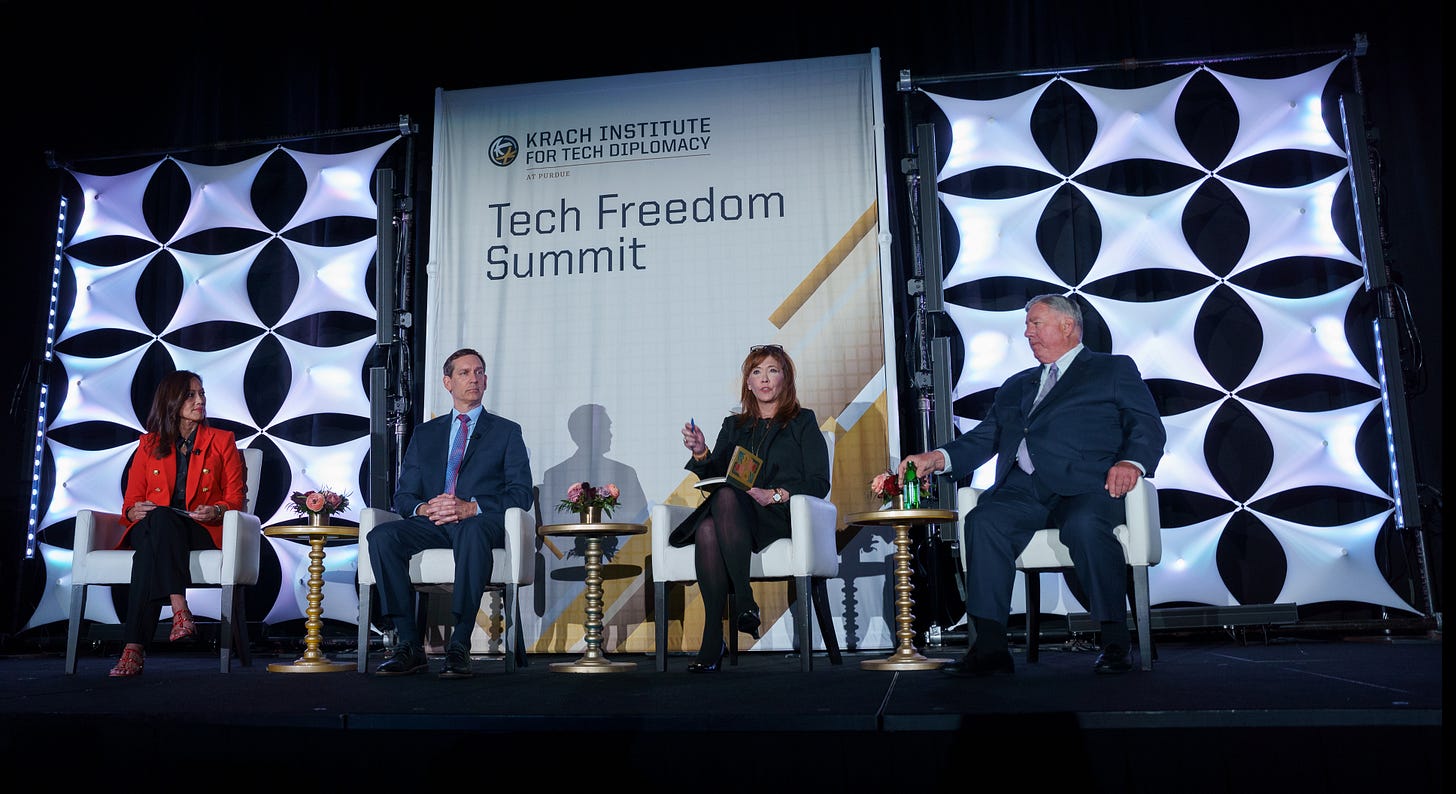
The 'AI and National Security' panel, introduced by Krach Institute Senior Research Fellow Dan DeLaurentis, brought together experts like Tom Barton, aerospace pioneer Dana Linnet, and Cerberus Capital’s Amir Salek to discuss the collaboration between Silicon Valley, D.C., and academia in AI and national security technology.
“Trust of tech is a great investment opportunity,” Amir Salek brought up during a discussion on the myriad of methods Trusted Technology can be advanced.
“There should be a value proposition. I think by putting more investment and bringing more talent and infrastructure to this area. It would … be compliant by construction.”

Yuval Porat, CEO of KAZUAR Advanced Technologies LTD, sent a pre-recorded address from Israel to remind us that the fight for freedom is not just a distant concept but a daily reality for many. Despite the challenging times, Yuval's message was a beacon of hope and determination and a rally for freedom.
Tech Freedom Awards
The summit also celebrated the Tech Freedom Awards, recognizing Taiwan President Tsai Ing-wen, Dr. Alex Karp, and Roger Robinson, Jr., for their contributions to Tech Diplomacy and advancing freedom
The Krach Institute For Tech Diplomacy celebrates Dr. Alex Karp, the Founder and CEO of Palantir Technologies, as he receives the prestigious Tech Freedom Award. Dr. Karp's leadership in advancing technology for the greater good is vital in our defense of freedom.
As former DocuSign CEO and Under Secretary of State Keith Krach said, "Alex, when I imagine what CEOs can and should be doing to ensure that technology enhances freedom, I think of you. Thank you for your commitment to freedom and for your friendship with the Institute.”
Learn about Palantir's unwavering commitment to data privacy and its unique approach to ensuring technology enhances freedom at Palantir.com
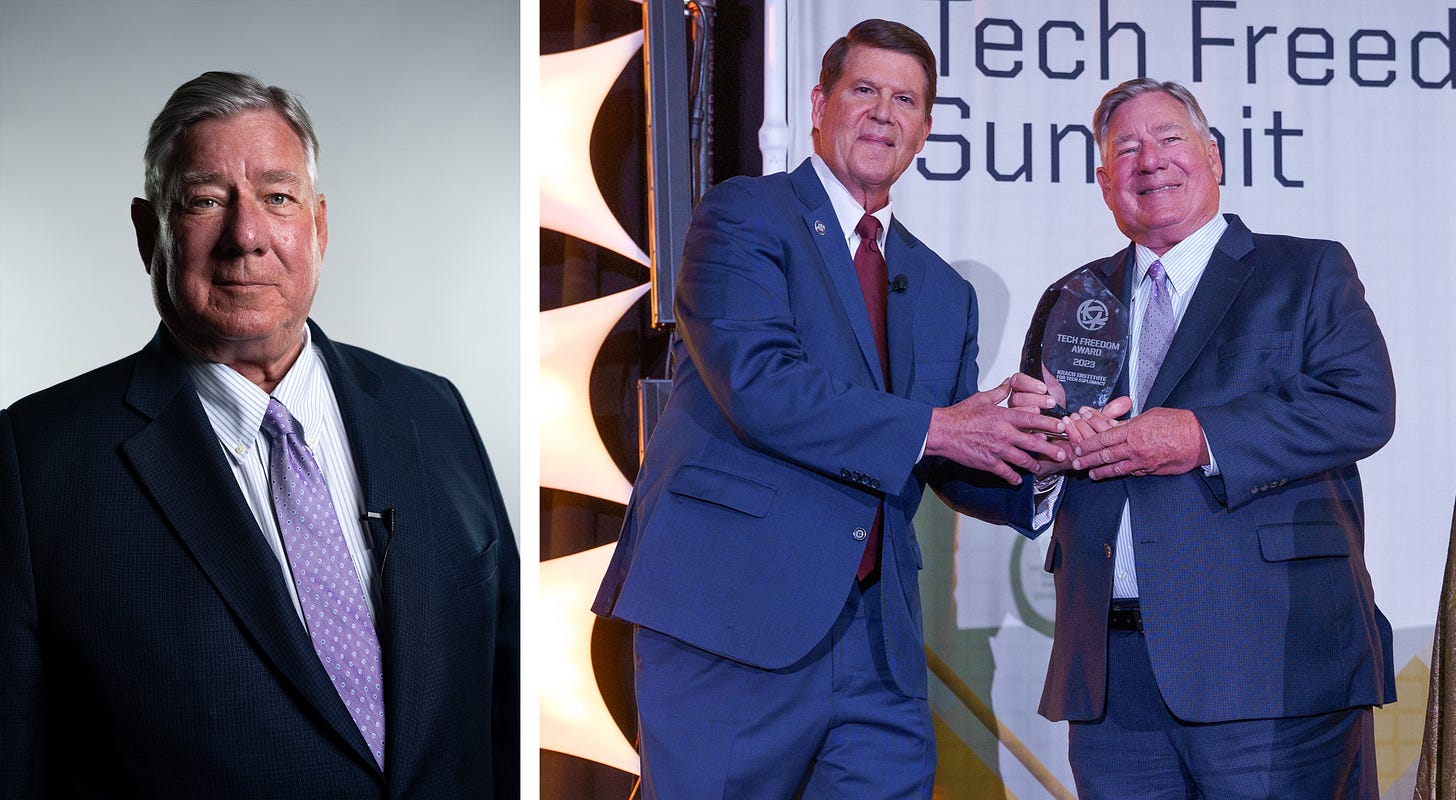
The Krach Institute For Tech Diplomacy celebrates Roger Robinson Jr. former Senior Director of International Economic Affairs at the Reagan National Security Council and current Co-Founder, of the Prague Security Studies Institute as he receives the prestigious Tech Freedom Award.
With over four decades of impactful work at the nexus of global economics, finance, and national security, Roger has been instrumental in shaping critical strategies and policies, most notably as the Senior Director of International Economic Affairs at the Reagan National Security Council and his work architecting the economic strategy that contributed to the downfall of the Soviet Union. More recently, he has provided crucial insights into the use of U.S. investor capital in activities threatening national security, particularly regarding the Chinese Communist Party.
As a valued member of the Krach Institute Advisory Council and the Global Tech Security Commissioner for Capital Markets, Roger's contributions have been both significant and transformative. His receipt of the Tech Freedom Award is a testament to his enduring commitment to safeguarding our digital world and promoting global security.
Chairman Keith Krach said that “Roger is the human equivalent of an economic Swiss Army knife with a career that zigzags through national security and global finance like a James Bond car chase, I think he's the man who looks at economic policy and sees an action packed, thrilling adventure.”
“In recognition of your dedication in advancing and securing our national and global economic security strategy and freedom for our people to work on capital markets that fund totalitarian tech. We salute you.”
Continue following the Tech Freedom Summit recap by visiting TechDiplomacy.org
Latest News
Russia suspends pact with Japan on decommissioning nuclear weapons – Japan Times, November 10, 2023
China has a sweeping vision to reshape the world — and countries are listening – CNN, November 10, 2023
Foreign investment in China goes negative for first time in decades – Axios, November 7, 2023
China blames Canada for ‘malicious, provocative’ moves after close midair intercepts over South China Sea – CNN, November 6, 2023
Technology Strategy and Policy
Why Can’t the West Stop Supplying Technology for Russian Weapons? – Foreign Policy, November 9, 2023
Optimizing Export Controls for Critical and Emerging Technologies: Reviewing Control Lists, Expanded Rules, and Covered Items – CSIS, November 8, 2023
China's nuclear program skirts Western machine tool sanctions – Nikkei Asia, November 7, 2023
Investigating China’s economic coercion: The reach and role of Chinese corporate entities – Atlantic Council, November 6, 2023
Artificial Intelligence
American AI Startups Quietly Raise Money From Top Chinese VC Firms, Including Sequoia Capital China – The Information, November 7, 2023
Google DeepMind’s robotics head on general-purpose robots, generative AI and office Wi-Fi – TechCrunch, November 4, 2023
Biden’s Elusive AI Whisperer Finally Goes on the Record. Here’s His Warning. – Politico, November 2, 2023
Telecommunications Networks and Infrastructure
Iridium Announces New D2D Direction – Iridium, November 9, 2023
Qualcomm-Iridium Deal to Bring Satellite Connectivity to Phones Collapses – PC Magazine, November 9, 2023
Apple Supplier Luxshare Ups Vietnam Investment by $330 Million – Bloomberg, November 10, 2023
Critical Minerals
Copper Market Slump Threatens Shift to Wind Power, Electric Cars – WSJ, November 11, 2023
Beijing Tightens Its Grip on the Critical Minerals Sector – Foreign Policy, November 7, 2023
China tightens rare-earth export curbs amid tension with U.S. – Nikkei Asia, November 7, 2023
Synthetic Biology
Is DNA Data Storage Ready for Data Centers? – SynBioBeta, November 7, 2023
Engineered ‘living materials’ could help clean up water pollution one day – The Conversation, November 7, 2023
Chinese scientists claim anti-ageing breakthrough with spinal cord discovery – SCMP, November 6, 2023
Can Chatbots Help You Build a Bioweapon? – Foreign Policy, November 5, 2023
Advanced Aerospace Technology
China’s Comac moves ahead with C929 widebody jet amid reports Russia joint venture has fallen apart – SCMP, November 5, 2023
China’s Space Collaboration with Africa: Implications and Recommendations for the United States – U.S. Institute for Peace, September 19, 2023
Semiconductors and Microelectronics
Nvidia Develops New AI Chips, Again, to Keep Selling to China – WSJ, November 10, 2023
China AI Startup Stockpiled 18 Months of Nvidia Chips Before Ban – Bloomberg, November 10, 2023
Thanks to US curbs, Chinese internet giants are seeking suppliers outside of Nvidia – Quartz, November 7, 2023
5nm chip is within China’s reach, says top lithographer – Bits & Chips, October 31, 2023
Energy and Climate
A New Law Supercharged Electric Car Manufacturing, but Not Sales – New York Times, November 8, 2023
The Revenge of Energy Security: Reconciling Asia’s Economic Security with Climate Ambitions – National Bureau of Asian Research, November 7, 2023
It May Be Too Late to Fend Off China’s Battery Giants – WSJ, November 7, 2023
Opinion and Commentary
Pro-Hamas TikTok videos hint at a broader Chinese influence campaign – Senator Marco Rubio, Washington Examiner, November 10, 2023
Apple’s Tim Cook Can’t Brush Off China Worries Forever – Dave Lee, Bloomberg, November 6, 2023
The U.S. Can Counter China’s Control of Minerals for the Energy Transition – James Morton Turner, NYTs, November 6, 2023
Britain is ignoring the real Chinese AI threat – Iain Duncan Smith, The Telegraph, October 27, 2023
About: Tech Diplomacy Now
The Krach Institute for Tech Diplomacy at Purdue is the world’s preeminent trusted technology accelerator. As the leader of the new category of Tech Diplomacy, the Institute integrates technology expertise, Silicon Valley strategies, and foreign policy tools to build the Global Trusted Tech Network of governments, companies, organizations and individuals to accelerate the innovation and adoption of trusted technology and ensure technology advances freedom.



